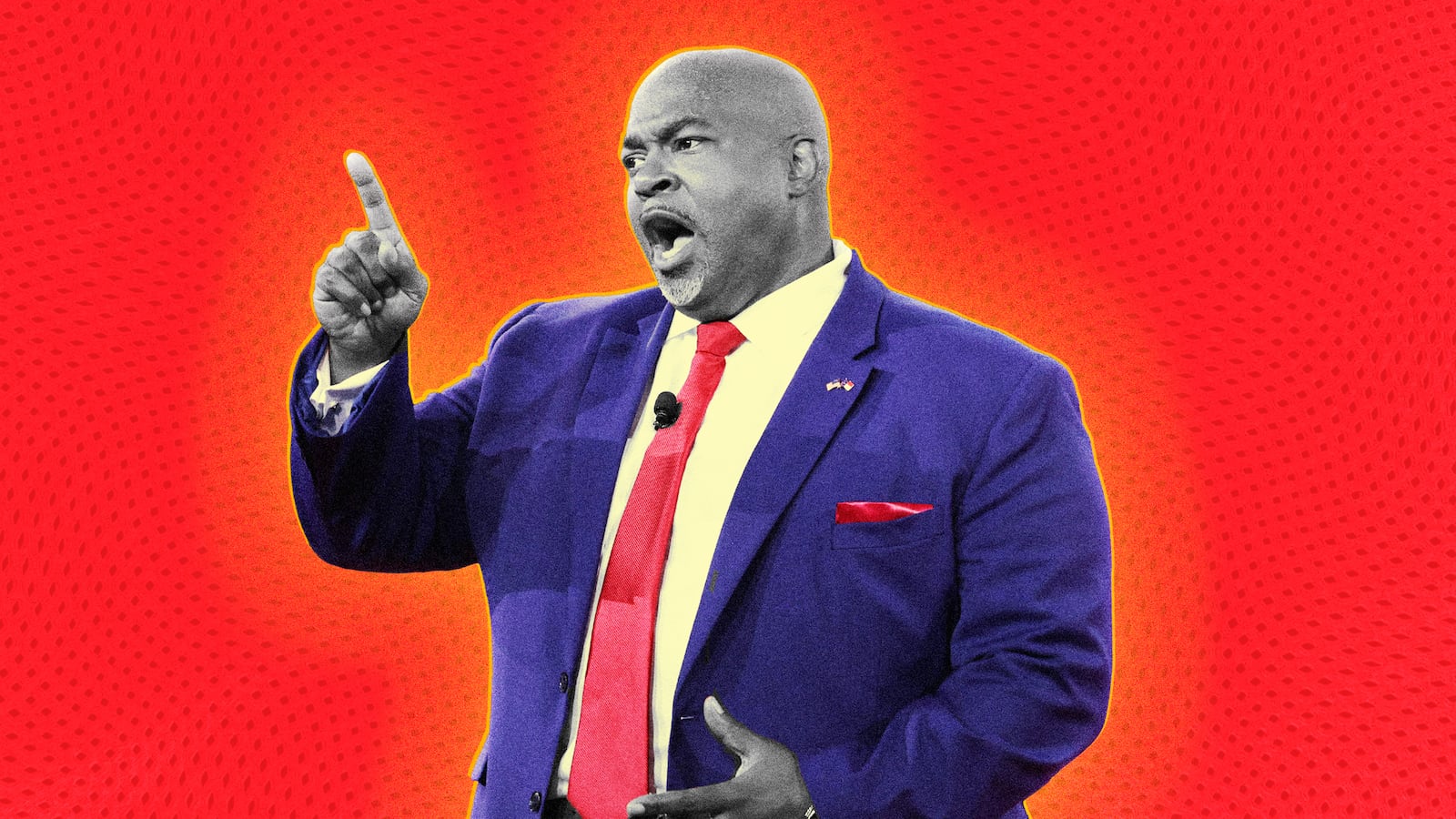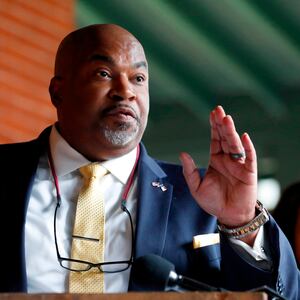Weeks after Republicans suffered major losses in the 2018 midterm elections because of their failed attempts to repeal the Affordable Care Act, then-conservative commentator Mark Robinson accused the law of attempting to “enslave” people.
Around two hours and 43 minutes into the YouTube program Politics and Prophecy—as an image displaying “Bloodlines of the Illuminati” is shown on screen—Robinson makes his declaration.
“It is not just Black people,” Robinson, who is Black, said on the YouTube show. “It is a concentrated effort to, to, uh, to enslave everybody.”

The image shown on the Politics and Prophecy YouTube show while Mark Robinson said Obamacare was an effort to "enslave everybody."
Screenshot of Politics and Prophecy YouTube showRobinson—a flame-throwing conservative who has a history of trumpeting conspiracies, has referred to the Holocaust as “hogwash,” said he wants to “go back to the America where women couldn’t vote,” and has falsely accused President Joe Biden of stealing the 2020 election—is now the Republican nominee for governor in North Carolina.
The race between Robinson and North Carolina Attorney General Josh Stein, the Democratic nominee to succeed Democratic Gov. Roy Cooper, will be this cycle’s most closely watched gubernatorial campaign. And Democrats are eager to focus the race on health care in the Southern state, hoping to use Robinson’s opposition to the Affordable Care Act and his more recent antipathy to the state expanding Medicaid as a focal point of attacks against the Republican, employing a similar strategy that worked for the party in 2018.
Robinson’s particular complaint about the health-care law, signed by President Barack Obama in 2010, was against one of the most popular provisions: the ability for children to stay on their parents’ health-care plans until they turned 26 years old.
“That’s not a child, a 26-year-old,” said host Chris Levels, after just finishing a rant about fluoridated water.
“That’s exactly right. That’s exactly right,” Robinson replied, before accusing the law of trying to “enslave everybody.”
Soon after those comments, Robinson also disclosed that he was “disgusted with a lot of churches” because of their embrace of LGBTQ people.
“You see homosexuals in leadership positions, you see people who are living in sin in leadership positions. It’s disgusting. It really is disgusting,” Robinson said.
“There’s not supposed to be any political correctness in church,” he added.
Robinson, with his history of bombastic comments, has even argued for a more conservative position on health care than Trump, who made repealing Obamacare a focal point of his successful 2016 campaign and attempted to do just that when he took office in 2017. Trump, in a bid to assuage critics who worried that taking away health care with no replacement would be politically detrimental to Republicans, often said he would replace the Affordable Care Act “with reforms that expand choice, freedom, affordability.”
"You’re going to have such great health care at a tiny fraction of the cost. And it’s going to be so easy,” Trump said during a rally in Florida in the final days of the 2016 campaign, rarely providing specifics to that promise.
He ultimately got on board with a Republican alternative that was projected to kick 23 million people off health insurance, significantly raise prices for people with pre-existing conditions, and send health insurance markets—according to the nonpartisan Congressional Budget Office—into an “unsustainable spiral.”
Robinson, however, advocated for full repeal of the Affordable Care Act with no replacement—an even bleaker alternative.
"I just want REPEAL! When it comes to insurance/healthcare the federal government can kick rocks,” he wrote on Facebook in 2017. “Healthcare’ is neither a ‘right’ or a ‘privilege,’ it’s a RESPONSIBILITY that lies with the individual.”
In another instance, he posted a photo on Facebook that showed “Repeal and Replace” but put a line through “and replace.”
“The Federal Government DOES NOT Need To Be Involved With Health Insurance,” he wrote to go along with the photo.
Trump failed to repeal Obamacare when the late Sen. John McCain (R-AZ) cast the deciding vote to keep the health care law in place. But the political implications of Trump’s work to repeal the law still propelled Democrats to the House majority, with Democrats making protecting health care a focal point of their campaigns in 2018.
Obamacare’s popularity is currently near record highs. While opposition to the law contributed to Democrats losing the House in 2010, public polling has shown a steady increase in support for the law in recent years. A Kaiser Family Foundation survey found last month that 59 percent of American adults approved of the Affordable Care Act, compared to 39 percent who did not.
This issue particularly resonates in North Carolina, a state that expanded Medicaid with bipartisan support late last year after a prolonged political fight, giving around 600,000 people additional access to the program.
Democrats in North Carolina are hoping they can use Robinson’s past comments on health care, coupled with the recent expansion of health-care coverage, in the same way the party did in 2018.
“I can only imagine he will continue to double down on this stance. And our work is educating voters on the impacts of that,” said Elisabeth Greenleaf, campaigns director for Progress North Carolina, one part of a coalition of groups opposing Robinson’s candidacy. “It’s going to be a big issue in this race.”
Predictably, Robinson opposed expanding Medicaid.
“I’m not in favor of Medicaid expansion,” he told Business North Carolina in 2022. “I hope that it fails because I don’t want our health care in this state to be turned over to the federal government.”
And in 2023, after Medicaid expansion passed, Robinson said he was “dismayed” that it was included in the budget.
“I’m still not in favor of that,” he told a local radio host, a comment that Stein’s campaign has already jumped on.
Stein has used that opposition as a political cudgel against Robinson, with the Democratic campaign repeatedly branding the lieutenant governor as “out of touch” in his opposition.
Robinson, however, has tried to soften his position on Medicaid expansion. Asked about these comments on Friday, Mike Lonergan, communications director for Robinson’s campaign, said, “While the lieutenant governor did not support Medicaid expansion, he understands that it is now the law in North Carolina.”
“As governor, Mark Robinson will work tirelessly to ensure that the people of North Carolina get the absolute best results and care possible from our new Medicaid expansion program,” Lonergan added.
Lonergan declined to comment on Robinson’s past comments about repealing the Affordable Care Act or comparing it to enslavement.








